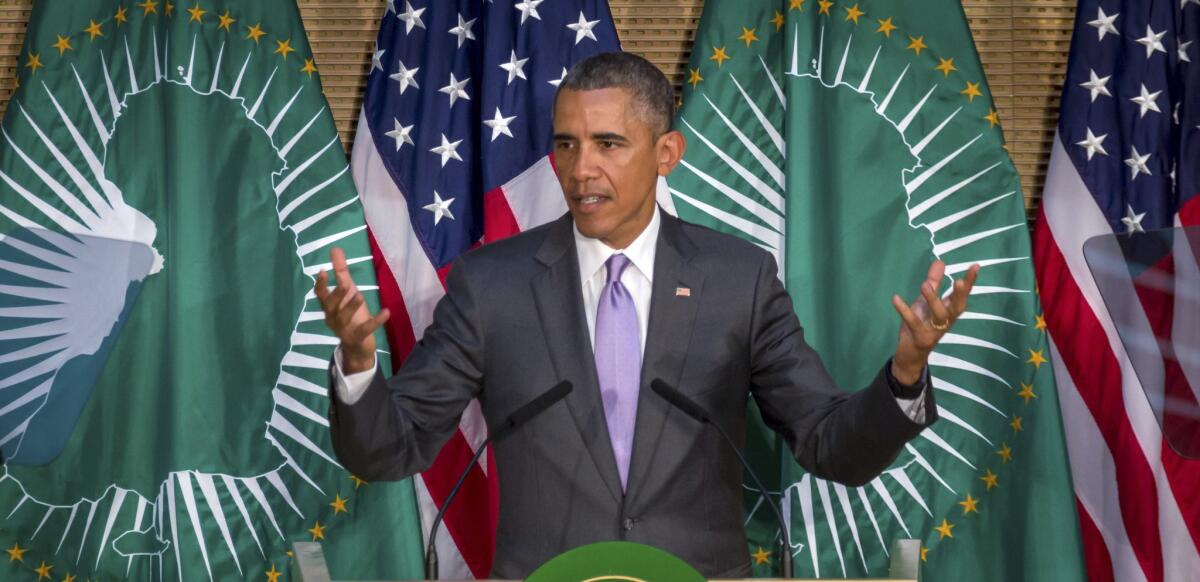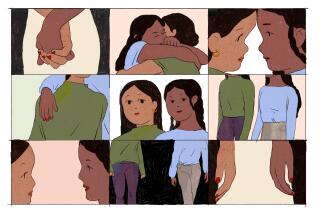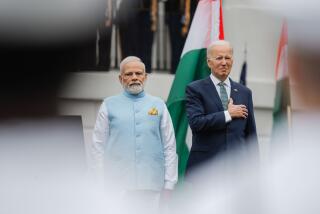Rights groups criticize Obama for calling Ethiopia’s election ‘democratic’

President Obama delivers a speech to the African Union in Addis Ababa, Ethiopia, on Tuesday.
- Share via
Reporting from Johannesburg, South Africa — As a democracy, Ethiopia is far removed from the ideal that President Obama spelled out for Africa in his first trip as president to the continent in 2009.
Visiting Ghana then, Obama famously said Africa needed strong institutions, not strongmen.
Human rights groups had expressed concern about Obama’s decision to become the first sitting U.S. president to visit Ethiopia, a nation that has few real democratic institutions, routinely harasses and jails journalists and bloggers, and is accused of torture. But they were shocked when, on Monday, the president twice described the country’s May elections as “democratic.”
Ethiopia’s ruling party, the Ethiopian People’s Revolutionary Democratic Front (EPRDF) and its allied parties recorded an almost 100% victory in those elections, winning every seat in the parliament — the kind of implausible victory margin common in dictatorships.
During his Africa tour, which ended Tuesday, Obama made the case that no one questions U.S. engagement with China and Russia. The U.S. could achieve more by engaging and telling blunt truths to leaders, he has argued.
“But the president didn’t give them blunt truths in saying they had a democratic election when their election in May had intimidation of opposition figures, arrests and detentions of political watchdogs and 100% of the seats in the parliament were filled by the ruling party,” said Mark P. Lagon, president of Freedom House, in an interview Tuesday. “The president was giving them a warm kiss when they didn’t deserve it.”
He said Obama was “fundamentally wrong” in his comments about the election. “Calling Ethiopia’s government ‘democratically elected’ lowers the standards for democracy and undermines the courageous work of so many Ethiopians who fight to realize a just and democratic society.
“I think it hurts U.S. credibility and I think it even hurts any partnership we may have in counter-terrorism. If the government of Ethiopia doesn’t think the U.S. is going to stand up for its very clearly avowed principles, it harms our relationship.”
Ethiopia is rated “not free” in terms of politics and civil rights by Freedom House, a watchdog organization. Lagon said Ethiopia was so closed and secretive that it was a “suspect partner” in security and counter-terrorism.
Opposition parties have complained that Ethiopia’s election board, seen by critics as a tool of the ruling party, didn’t cooperate with their efforts to lodge complaints after the May election.
The EPDRF, a former rebel group, came to power in 1991 after it toppled the regime of dictator Mengistu Haile Mariam, and has won the five elections since.
When Obama traveled to Ghana in 2009, he extolled the values of human rights and democracy. Until his current trip, he had steered clear of nations with poor records on those issues, rewarding those with better records with presidential visits. His trip to Ethiopia seemed to signal a more pragmatic approach, acknowledging Ethiopia and Kenya as strategic allies and key partners in the counter-terrorism fight.
His visit to Ethiopia came at a time when China, which isn’t concerned about the rights and democracy records of some African states, has surged in prominence on the continent, leaving the U.S. behind as it offers hundreds of billions of dollars in soft loans and infrastructure projects.
Even as Obama called for Ethiopia to end its crackdown on journalists and allow criticism and dissent, Ethiopian Prime Minister Hailemariam Desalegn made clear his disdain for the country’s few independent journalists. On Monday, he repeated a justification often used by the government for jailing journalists, accusing them of having terrorist ties. He called for journalism that was “ethical,” “civilized” and told the good news about Ethiopia.
“As far as Ethiopia is concerned, we need journalists,” he said, adding, “but we need ethical journalism to function in this country.”
He said, “Journalism has to be respected, when it doesn’t, you know, pass the line [of] working with violent terrorist groups.”
“It’s an attempt to speak the language that the president of the U.S. understands, but it’s a gross abuse of the term,” said Maya Foa of Reprieve, a Britain-based human rights group.
“There’s been a massive overuse and exploitation of this concept of terrorism in Ethiopia. You could translate it as those individuals who express opinions that differ from the ruling party, including journalists,” she said.
After an outcry over his Monday remarks, Obama seemed to try to deliver a more nuanced message Tuesday, saying he had told the prime minister that when journalists were jailed and activists harassed, “you may have democracy in name but not in substance.”
The human rights group Reprieve, which Tuesday called Obama’s comments on democracy in Ethiopia “woefully misplaced,” has been campaigning for the release of a Briton, Andy Tsege, who is an official of a banned opposition movement. He has spent 399 days in a secret Ethiopian jail after being abducted while traveling and rendered to Ethiopia.
“Throughout his 13 months in detention, Mr. Tsege has not been allowed contact with a lawyer, and has spoken to his family only once. He faces a death sentence handed down in absentia in 2009 in relation to his political activities, and there are fears that he is being tortured,” according to a Reprieve statement Tuesday.
In 2006, Tsege visited Washington and addressed Congress, comparing the EPDRF repression of dissent with the darkest days of military rule.
Lagon said that while Obama’s remarks offered comfort to the government of Ethiopia, they sent a message to struggling Ethiopian rights activists that the U.S. wasn’t willing to stand up for them.
Follow @RobynDixon_LAT for news from Africa
More to Read
Sign up for Essential California
The most important California stories and recommendations in your inbox every morning.
You may occasionally receive promotional content from the Los Angeles Times.










